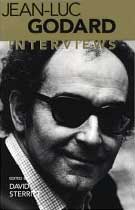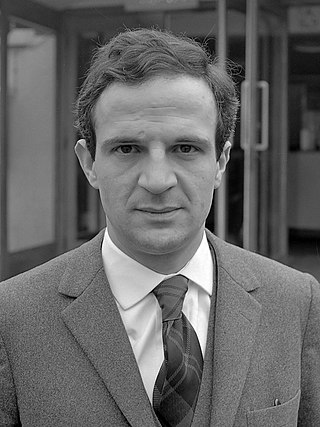
François Roland Truffaut was a French filmmaker, actor and critic, widely regarded as one of the founders of the French New Wave. As a young man, he came under the tutelage of film critic Andre Bazin, who hired him to write for his Cahiers du Cinéma. It was there that he became an exponent of the auteur theory, which said the director is the true author of the film. The 400 Blows (1959), starring Jean-Pierre Léaud as Truffaut's alter-ego Antoine Doinel, was a defining film of the New Wave. Truffaut supplied the story for another milestone of the movement, Breathless (1960), directed by his Cahiers colleague Jean-Luc Godard.
Andrew Sarris was an American film critic. He was a leading proponent of the auteur theory of film criticism.

Jean-Luc Godard was a French and Swiss film director, screenwriter, and film critic. He rose to prominence as a pioneer of the French New Wave film movement of the 1960s, alongside such filmmakers as François Truffaut, Agnès Varda, Éric Rohmer and Jacques Demy. He was arguably the most influential French filmmaker of the post-war era. According to AllMovie, his work "revolutionized the motion picture form" through its experimentation with narrative, continuity, sound, and camerawork.

Irréversible is a 2002 French rape and revenge art horror film written and directed by Gaspar Noé. Starring Monica Bellucci, Vincent Cassel, Albert Dupontel, the plot depicts the events of a tragic night in Paris as two men attempt to avenge the brutal rape and beating of the woman they love. The film is made up of a title sequence followed by 13 segments made to look like long takes. Each of these segments is either a continuous shot or a series of shots digitally composited to resemble a continuous shot. The story is told in reverse order, with each scene taking place chronologically before the one that precedes it.

Breathless is a 1960 French New Wave crime drama film written and directed by Jean-Luc Godard. It stars Jean-Paul Belmondo as a wandering criminal named Michel, and Jean Seberg as his American girlfriend Patricia. The film was Godard's first feature-length work and represented Belmondo's breakthrough as an actor.

The New Wave, also called the French New Wave, is a French art film movement that emerged in the late 1950s. The movement was characterized by its rejection of traditional filmmaking conventions in favor of experimentation and a spirit of iconoclasm. New Wave filmmakers explored new approaches to editing, visual style, and narrative, as well as engagement with the social and political upheavals of the era, often making use of irony or exploring existential themes. The New Wave is often considered one of the most influential movements in the history of cinema.
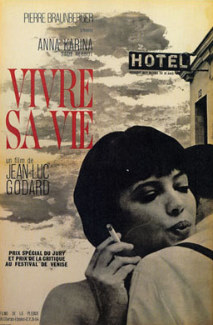
Vivre sa vie is a 1962 French New Wave drama film written and directed by Jean-Luc Godard. The film was released in the United States as My Life to Live and in the United Kingdom as It's My Life.

Jacques Rozier was a French film director and screenwriter. He was one of the lesser-known members of the French New Wave movement and has collaborated with Jean-Luc Godard. Three of his films have been screened at the Cannes Film Festival. In 1978, he was a member of the jury at the 28th Berlin International Film Festival.
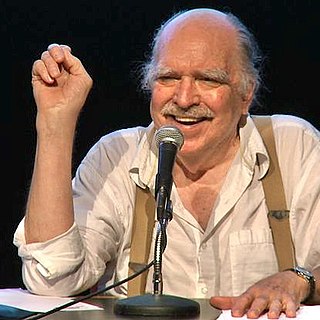
Gene Youngblood was an American theorist of media arts and politics, and a respected scholar in the history and theory of alternative cinemas. His best-known book, Expanded Cinema, was the first to consider video as an art form. He has been credited with helping to define and legitimate the fields of computer art and digital art.

Hail Mary is a 1985 French avant-garde erotic drama film written and directed by Jean-Luc Godard. The film is a modern retelling of the story of the virgin birth of Jesus. It was entered into the 35th Berlin International Film Festival.
Cinephilia is the term used to refer to a passionate interest in films, film theory, and film criticism. The term is a portmanteau of the words cinema and philia, one of the four ancient Greek words for love. A person with a passionate interest in cinema is called a cinephile, cinemaphile, filmophile, or, informally, a film buff. To a cinephile, a film is often not just a source of entertainment as they see films from a more critical point of view.

Histoire(s) du cinéma is an eight-part video project begun by Jean-Luc Godard in the late 1980s and completed in 1998. The longest, at 266 minutes, and one of the most complex of Godard's films, Histoire(s) du cinéma is an examination of the history of the concept of cinema and how it relates to the 20th century; in this sense, it can also be considered a critique of the 20th century and how it perceives itself. The project is widely considered Godard's magnum opus.
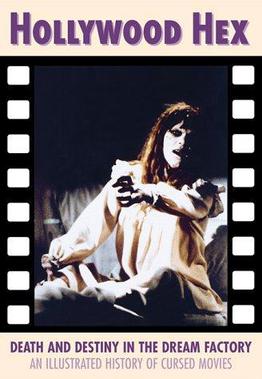
Hollywood Hex is a book by Mikita Brottman, an in-depth history of movies plagued with bad luck or perceived as cursed. The book deals with deaths on-set, copycat crimes, obsessed fans, bizarre coincidences, and other incidents which lead a film to be called "cursed".

Meat Is Murder: An Illustrated Guide to Cannibal Culture is a book originally published in 1998, which examines cannibalism in myth, true crime, and film.
Nouvelle Vague is a 1990 French film written and directed by Jean-Luc Godard. It follows the story of hitchhiker Lennox credited as Lui (He), taken in by a wealthy industrialist, Elena Torlato-Favrini or Elle (She), played by Domiziana Giordano. The film was entered into the 1990 Cannes Film Festival. It has never been released on any home video format in North America, but the audio was issued as a 2CD set by ECM.

Mikita Brottman is a British American non-fiction author, scholar, and psychoanalyst known for her interest in true crime. Her writing blends a number of genres, often incorporating elements of autobiography, psychoanalysis, forensic psychology, and literary history.
Christopher Robé is a professor in film and media studies at Florida Atlantic University. He has published Left of Hollywood: Cinema, Modernism, and the Emergence of U.S. Radical Film Culture., which resituates such well-known auteurs like Sergei Eisenstein and Jean Renoir in an American political context.,. It also argues that the 1930s proved a vital moment in time regarding the emergence of Left Film Theory,.

The Image Book is a 2018 Swiss avant-garde essay film directed by Jean-Luc Godard. Initially titled Tentative de bleu and Image et parole, in December 2016 Wild Bunch co-chief Vincent Maraval stated that Godard had been shooting the film for almost two years "in various Arab countries, including Tunisia" and that it is an examination of the modern Arabic world. Godard told Séance magazine that he was shooting without actors but the film would have a storyteller. It was selected to compete for the Palme d'Or at the 2018 Cannes Film Festival. The film was positively received by film critics. It was the final feature film directed by Godard before his death in 2022.
Modernist film is related to the art and philosophy of modernism.
Robert Phillip Kolker is an American film historian, theorist, and critic. He has authored and edited a number of influential books on cinema and media studies. He is a Professor Emeritus at the University of Maryland, College Park.

